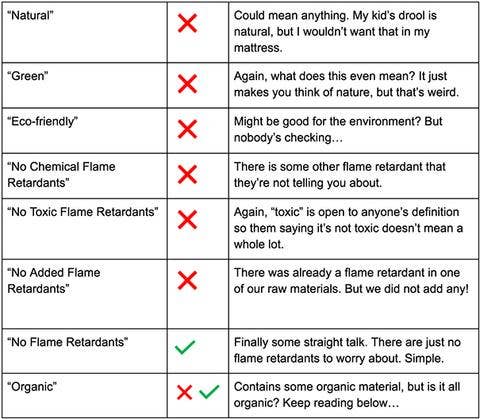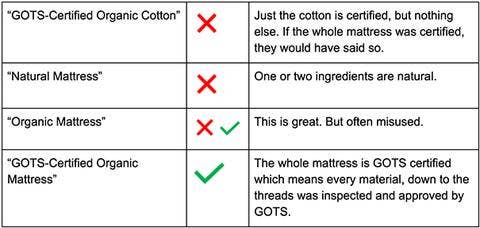There are lots of mattress companies to choose from and, as you’ll see, there is a lot of misinformation out there. Let’s try to break it down in simple terms.
Why Go Organic?
Ok, if you’re on our website, chances are you are already kind of into the idea of organic. But humor us for a minute. Why should you care about getting an organic mattress?
Mattresses are known to contain some pretty nasty chemicals. Why? In a nutshell, most of the ingredients are made from petroleum, which easily catches on fire. Yikes. To deal with this problem, mattress companies would add flame retardant chemicals into the mix (to limit the whole having-your-mattress-get-set-on-fire scenario). And voila! A chemical-soaked petroleum mattress for you to mush your face into for 8 hours a day.
And, if you’re not cringing yet, there is also an environmental impact when a bulky chemical-filled mattress ends up in the landfill, passing those chemicals out into the environment.
Enter Organic.
I’m not cringing yet. And I don’t plan on eating my mattress…
Oddly enough, we hear this a lot.
While it may be obvious why you wouldn’t want chemicals in food, it may be puzzling why it would matter if there are chemicals in your mattress. Who cares if there are chemicals or not? Well, the answer is simple. The government is much more loosey-goosey when it comes to what kind of chemicals can go into a mattress, than it is on what kind of chemicals can go into your food (if someone was trying to put flame retardants in your applesauce, the FDA would be on that like white on rice!). So there can be some pretty terrible stuff in your mattress that is legally ok. It would be one thing if these chemicals stayed buried in your mattress, but research has shown that that’s just not the case. The chemicals in your mattress off-gas into the air and continue for years, as your mattress decays over time. Creepy, no?
But I’ve seen mattresses called “Green”, “Eco-Friendly”, “Natural” and “Organic.” What does it all mean?
Companies love to label their products as “Green” or “Eco” because it sounds good. And, as it turns out, there’s pretty much no regulation on how to use these terms, so they’re basically up for grabs. Want to call your new toaster “eco-friendly”? No problem! Or, in other words, a big problem, because these claims make us all buy things under false pretenses!
We’ve been developing organic mattresses for a long time, so we don’t like it when people pretend their product is organic when it’s not. Since we know the mattress industry pretty well, we’ve made you a little cheat sheet for what these terms mean.
You’re welcome, informed shopper.

Tell me more about organic.
Here’s the pearl of wisdom we have to give you. To truly be an organic mattress, a mattress should be certified organic. Seems like a no-brainer, right? If you were shopping for a can of organic corn, you would notice a little USDA-certified label that makes it legit.
Many companies throw around the word organic, but if there’s no certification, it means nada. It’s basically the equivalent of a canned corn company that slapped the word “organic” on there without the USDA being involved at all.
So who decides if a mattress is organic? An organization called GOTS (Global Organic Textile Standard). If a mattress is GOTS certified, like our Happsy mattresses, you know it’s the real deal. If it’s not GOTS certified, you have to wonder what else those companies are putting in their mattresses.
Here’s another cheat sheet to help you understand organic terms:

If you’re still not convinced, read how Happsy goes above and beyond organic standards.
